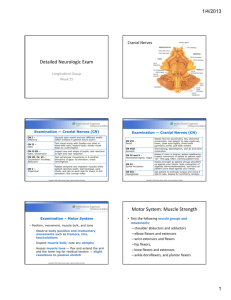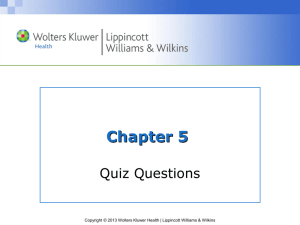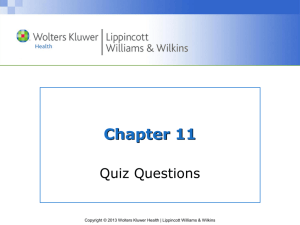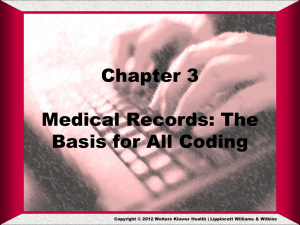LWW PPT Slide Template Master - Northern Highlands Regional HS
advertisement
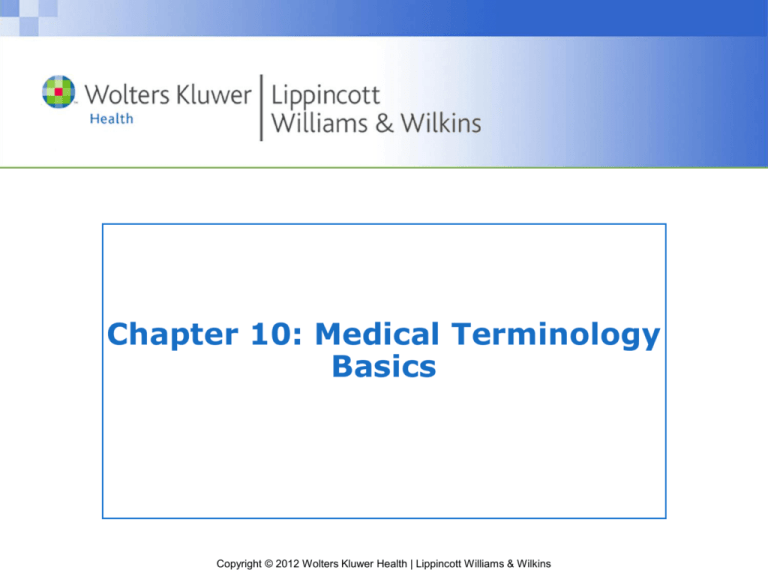
Chapter 10: Medical Terminology Basics Copyright © 2012 Wolters Kluwer Health | Lippincott Williams & Wilkins Introduction • Greek & Latin influences • Understanding medical terminology: – Adds precision – Helps prevent medical mistakes Copyright © 2012 Wolters Kluwer Health | Lippincott Williams & Wilkins Word Parts • Root – Fundamental element of every medical term – Establishes basic meaning • Suffix – Short element added to end of root to modify its meaning • Prefix – Short element added before root to modify its meaning Copyright © 2012 Wolters Kluwer Health | Lippincott Williams & Wilkins Word Parts (cont’d) • Most medical terms are composed of roots, suffixes, & prefixes Copyright © 2012 Wolters Kluwer Health | Lippincott Williams & Wilkins Word Parts (cont’d) • Root and Combining Form – Basis for term’s meaning – Most derived from Greek or Latin – Compound word: contains more than one root – Vowel (usually o) inserted between root & suffix – Example: cardi + o + logy = cardiology (“study of the heart”) – Root + combining vowel = combining form Copyright © 2012 Wolters Kluwer Health | Lippincott Williams & Wilkins Word Parts (cont’d) • Some terms include a root, a combining vowel, and a suffix Copyright © 2012 Wolters Kluwer Health | Lippincott Williams & Wilkins Word Parts (cont’d) • Suffix – Letter or combination of letters added to end of a root – Modifies root’s meaning – Can indicate part of speech or number – Typically adds meaning to beginning of a word’s definition – Often used to describe a symptom, disease, or surgical treatment – Example: psych + o + -logy = psychology (“study of the mind”) Copyright © 2012 Wolters Kluwer Health | Lippincott Williams & Wilkins Word Parts (cont’d) • Prefix – Changes meaning of word to which it is added – Attached to beginning of root word or combing form – Indicates position or direction (anti-) – Indicates size or quantity of measurement (micro-) – Denotes time or rate of change (tachy-) Copyright © 2012 Wolters Kluwer Health | Lippincott Williams & Wilkins Decoding Medical Terms • 1. Break term into its parts – echocardiogram: echo- + cardio + -gram • 2. Determine meaning of each part – echo- = “a returned or reflective sound” – cardio = “heart” – -gram = “record” • 3. Join definitions of each part to create overall meaning – “a record of the heart made by using returned or reflective sounds” Copyright © 2012 Wolters Kluwer Health | Lippincott Williams & Wilkins Spelling • Watch Out for the Following – Same sound, different spelling & meaning • Example: ileum (part of intestine) vs. ilium (part of hip bone) – Similar sound, different spelling & meaning • Example: abduction (to draw away from) vs. adduction (to draw towards – Silent letters in a term: p in pterygium – Pay attention to context Copyright © 2012 Wolters Kluwer Health | Lippincott Williams & Wilkins Pronunciation • Pronunciation of word parts often changes when combined in different ways • Pronunciations vary by region Copyright © 2012 Wolters Kluwer Health | Lippincott Williams & Wilkins Abbreviations and Symbols • Shortened forms of a word or group of words • Time savers • Can cause confusion when not universally used • Usage varies in different institutions • Follow policies of your institution • Acronym: an abbreviation formed from first letter of each word in a phrase (ASAP = as soon as possible) Copyright © 2012 Wolters Kluwer Health | Lippincott Williams & Wilkins Using a Medical Dictionary • Specialized reference books used by health care professionals • Includes – Meaning & pronunciation of terms – Synonyms – Origins of words (etymology) Copyright © 2012 Wolters Kluwer Health | Lippincott Williams & Wilkins Using a Medical Dictionary (cont’d) • Common Information Found in Appendices – Measurements – Clinical tests – Drugs – Diagnoses – Body structures – Information resources Copyright © 2012 Wolters Kluwer Health | Lippincott Williams & Wilkins Using a Medical Dictionary (cont’d) • Special Dictionary Formats – Specialized for a certain field (Nursing) – Portable size – CD format – Online format – Medical acronyms & abbreviations books Copyright © 2012 Wolters Kluwer Health | Lippincott Williams & Wilkins
